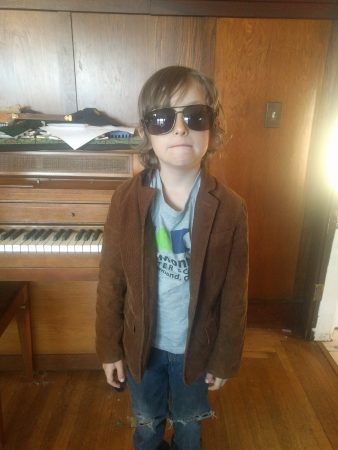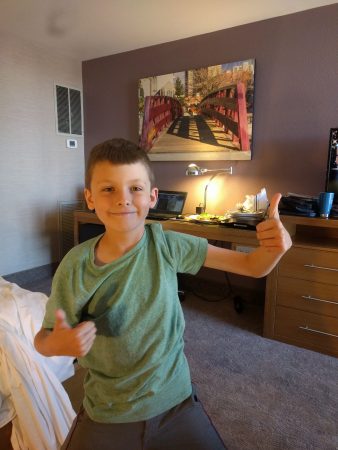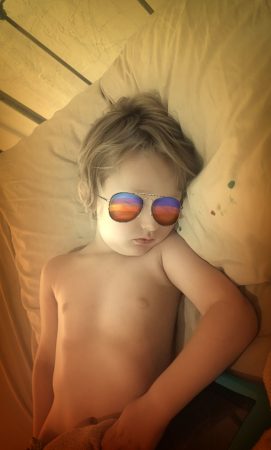Today Sol was formally diagnosed with autism, a step that comes as no surprise to anybody who has been close to him. At four years old he’s still not really talking, except in scattered words and lines quoted from his favorite videos. He’s clearly bright—he’s taught himself to read, in fact, at least at an early/beginning stage—but he’s just utterly unaware of, and uninterested in, social conventions and boundaries. And I’m talking boundaries like “don’t dig out all the soil from the potted plants and strew it all across the living room,” or “if you happen to find the front door unlocked, don’t run out in the middle of the street in your diaper and jump around there.” He is Not Like Other Kids.
He’s also sweet, loving, and happy—delighted with himself most of the time, and delighted to be in the world. He’s singleminded in focus when something interests him. He’s physically active and well-coordinated—loves jumping, climbing, and throwing things. He’s cuddly and affectionate. He really obviously thinks it’s pretty great being Sol.
My focus, on parenting Sol, is on supporting him to do the things he wants to do rather than trying to change or “cure” him. I think autism, or brains that work differently in general—neurodivergence or neurodiversity—is a benefit to humanity. I really value the perspective that my friends who are on the spectrum share. So I consider myself a supporter of the autism acceptance movement, and I have resisted the steady drumbeat of alarm from friends and family who repeat the words “early intervention” as if it’s some kind of mantra. Firstly, autism is a difference, not a disease; it can’t be cured and it shouldn’t be stigmatized. Secondly, I don’t want to intervene in Sol’s development, I want to support it.
I’ve done a lot of reading of blogs by adult autistic people about the “interventions” they endured in childhood, and there are some real horror stories out there. Many adults actually have PTSD from the abuse they suffered in the name of therapy. As the Autistic Self-Advocacy Network puts it:
“Many therapies and products for Autistic children and adults are helpful and should be made more widely available, such as physical therapy, speech therapy, occupational therapy, and augmentative and assistive communication technology (including supported typing, facilitated communication and other methodologies that support communications access). However, ASAN opposes the use of behavioral programs that focus on normalization rather than teaching useful skills. One of the guiding principles underlying the United Nations Convention on the Rights of Persons with Disabilities is respect for the right of children with disabilities to preserve their identities. Autistic children should not have to grow up constantly being told that their natural behaviors are wrong and that they cannot be accepted as they are.”
It took us almost a year of navigating a ridiculous bureaucracy to even get Sol diagnosed in the first place, and now that we have? We get to wait another month before we’re formally added to the rolls of the Regional Center of the East Bay, the private non-profit that’s under contract from the California Department of Developmental Services to provide service and support for people with developmental disabilities. I think Sol could benefit from speech therapy so that’s my goal right now, but I would really like everyone to understand that getting services for him isn’t an easy or a straightforward process (and certainly not a quick one).
And most of all I need those close to us to understand that there’s not, like, a magic wand any specialist can wave over Sol’s head to transform him into a “normal” kid. He is always going to have a brain that works differently, and those of us who love him are privileged to benefit from his unique perspective on the world.














